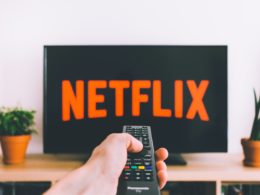In this era of COVID-19, transmission of the virus poses a great challenge for producers of television programming. For the past year, television programs have constantly had to adjust to ever-changing production restrictions mandated by government and public health authorities. For ViacomCBS, which produces shows for Nickelodeon and other cable channels, pandemic-related production delays have resulted in significant losses.1[1]Lauren Berg, ViacomCBS Sues Insurer Over Denial of COVID-19 Coverage, Law 360 (January 15, 2021, 6:17 PM), https://www.law360.com/media/articles/1345586/viacomcbs-sues-insurer-over-denial-of-covid-19-coverage. ViacomCBS thus turned to its television production insurer, Great Divide Insurance Company (“Great Divide”), to cover those losses under the policy provision that insures “against all risks of direct physical loss or damage to the property covered from any external cause,” except as otherwise excluded.[citation?] . When Great Divide declined coverage, Viacom sued for breach of contract in the U.S. District Court for the Central District of California.2[2]Complaint at ¶ 3, ViacomCBS Inc., v. Great Divide Ins. Co., 2021 WL 145178 (C.D. Cal. Jan. 14, 2021) (No. 2:21-CV-00400).
In its complaint, ViacomCBS contends that Great Divide breached the insurance contract in “bad faith,” by interpreting it to exclude virus and pandemic coverage.3[3]Id. at ¶26. ViacomCBS argues that because its policy did not contain the standard form exclusion for losses caused by viruses and bacteria, the “direct physical loss” language requires coverage even if no property was physically damaged. ViacomCBS also asserts that Great Divide wrongfully refused to follow industry practice and automatically renew the policy for a third annual period that coincided with the worst of the pandemic.4[4]Id. at ¶109. Instead, Great Divide offered to renew only if ViacomCBS would accept the exclusion for losses caused by viruses and bacteria.5[5]Id. at ¶26.
In contrast, Great Divide argued that the ViacomCBS policy did not provide coverage for pandemic-related losses because they do not arise from a situation that “present[s] ‘certain, immediate and impending danger’ to persons or property.”6[6]Id. at ¶62. Great Divide further argues that it was not obligated to renew the policy for the third annual period under the same terms, pointing to the policy language that gives Great Divide “the right to review and revise for the third annual policy period, if necessary.”7[7]Id. at ¶86. ViacomCBS, however, dismisses this position by alleging that Great Divide violates “its and the industry’s long-established custom and practice” of providing proper insurance coverage to production companies.8[8]Id. at ¶2.
Illustrative of this custom and practice, the Supreme Court previously found that if language in an insurance contract has two possible interpretations, the policy language should be read in the manner that is “more favorable to the insured.”9[9]Aschenbrenner v. U. S. Fid. & Guar. Co., 292 U.S. 80, 86 (1934). For pandemic-related losses, other courts have ruled that the policies that insure against losses to physical property may not necessarily extend to any other damages that do not manifest themselves in physical loss.10[10]See, e.g., Santo’s Italina Café LLC v. Acurity Ins. Co., No. 1:20-cv-01192, 2020 U.S. Dist. LEXIS 239382, at 14 (N.D. Ohio Dec. 21, 2020); Henderson Rd. Rest. Sys., Inc. v. Zurich Am. Ins. Co., No. 1:20 CV 1239, 2021 WL 168422, at 2 (N.D. Ohio Jan. 19, 2021). For companies like ViacomCBS, this brings about the challenge of whether revenue related losses can be constituted as physical. Since courts have ruled that because the revenue loss is not physical property, the insurance policy may not cover COVID-19 related losses.
For television production companies, the issue raised in the present case is straightforward: if you suffer losses from the impact of COVID-19, can you rely on your production insurance policy to make you whole? Without this insurance, production companies will face difficulty in obtaining financing to mount their productions or take on the risk of loss should their production collapse or be significantly delayed.11[11]Courtney DuChene, The Show Can’t Go On… Without Insurance. Coverage for Film and Television Shrinks Amid COVID-19, Risk & Insurance (June 18, 2020), https://riskandinsurance.com/the-show-cant-go-on-without-insurance-coverage-for-film-and-television-shrinks-amid-covid-19/.
For the television industry, ViacomCBS Inc. v. Great Divide illustrates that production companies should avoid relying on pre-pandemic expectations of what their insurance policies cover. Television producers would be wise to make sure that their policies protect against the unexpected beyond physical damage. COVID-19 has resulted in huge losses that insurance companies will resist paying out unless they absolutely must.12[12]Id. Cases like ViacomCBS Inc. demonstrate the necessity for production companies to review and negotiate their insurance policies to better reflect unexpected and unprecedented consequences of the pandemic. In the future, television production may have to change the economic model to reduce upfront investment exposure that is not explicitly covered by insurance.
Written by: Jordan Tuchman
Jordan is a 2023 J.D. Candidate
1 Lauren Berg, ViacomCBS Sues Insurer Over Denial of COVID-19 Coverage, Law 360 (January 15, 2021, 6:17 PM), https://www.law360.com/media/articles/1345586/viacomcbs-sues-insurer-over-denial-of-covid-19-coverage.
2 Complaint at ¶ 3, ViacomCBS Inc., v. Great Divide Ins. Co., 2021 WL 145178 (C.D. Cal. Jan. 14, 2021) (No. 2:21-CV-00400).
3 Id. at ¶ 26
4 Id. at ¶109
5 Id. at ¶ 26
6 Id. at ¶ 62
7 Id. at ¶ 86
8 Id. at ¶ 2
9 Aschenbrenner v. U. S. Fid. & Guar. Co., 292 U.S. 80, 86 (1934).
10 See, e.g., Santo’s Italina Café LLC v. Acurity Ins. Co., No. 1:20-cv-01192, 2020 U.S. Dist. LEXIS 239382, at 14 (N.D. Ohio Dec. 21, 2020); Henderson Rd. Rest. Sys., Inc. v. Zurich Am. Ins. Co., No. 1:20 CV 1239, 2021 WL 168422, at 2 (N.D. Ohio Jan. 19, 2021).
11 Courtney DuChene, The Show Can’t Go On… Without Insurance. Coverage for Film and Television Shrinks Amid COVID-19, Risk & Insurance (June 18, 2020), https://riskandinsurance.com/the-show-cant-go-on-without-insurance-coverage-for-film-and-television-shrinks-amid-covid-19/.
12 Id.




